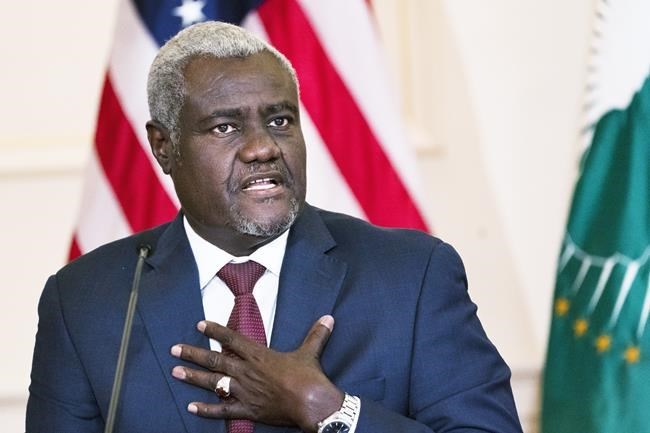OTTAWA — The African Union's high-level visit to Ottawa this week could signify a long-delayed focus on the continent, as countries vie for a piece of a growing economic pie.Â
Prime Minister Justin Trudeau will meet Wednesday with the African Union Commission head, Moussa Faki.
On Thursday, Faki will co-host a formal dialogue with Foreign Minister MĂ©lanie Joly, joined by Trade Minister Mary Ng and International Development Minister Harjit Sajjan.
The visit was promised in February 2020, just weeks before the COVID-19 pandemic.
It comes at a time when Russia and China are making a push for influence across the continent.
"The geopolitical competition for Africa's attention is as intense as it has ever been since the end of the Cold War," said University of Ottawa professor Rita Abrahamsen, who specializes in African studies.
She said the meeting could suggest Canada is getting serious about Africa.
"Canada has never had a consistent Africa policy. It has been arbitrary (and) fluctuating," Abrahamsen said.
"If this could indicate more of a coherent engagement, then that could be a significant change."
Similar to the European Union, the African Union aims to maintain peace and free trade, and includes most countries on the continent.Â
The organization, which turned 20 years old this summer, also intervenes militarily in situations like alleged crimes against humanity.
Lately, it has had to respond to famine-like conditions in East Africa, flooding in large parts of West Africa and a return of military coups.
That has left organizations such as the African Development Bank worried about the West diverting humanitarian aid to help Ukrainians after Russia's invasion.
Meanwhile, African countries have split in votes to condemn Russia, and the African Union has tried to maintain ties with Moscow.
"They're trying to maintain a position of neutrality and non-alignment, which is a very difficult position to navigate for the continent," Abrahamsen said.
Many states worry their humanitarian aid will be contingent on supporting Ukraine, with countries like Canada aggressively trying to isolate Russia. Joly has stressed that the invasion is a key driver in global food shortages.
"The AU is sensitive to western countries patronizing them, and telling them what to do and how to do it," said Abrahamsen, who is also the director of the Centre for International Policy Studies.
She said Ottawa should try to work with the African Union to shore up the rules-based international order.
"There has to be a partnership of equals," Abrahamsen said.Â
"There has been a general tendency to underestimate the extent to which Africa and the AU can actually be a positive player in safeguarding in multilateral co-operation."
The Liberals have been slowly increasing Canada's footprint on the continent, opening a new high commission in Rwanda and dedicating a permanent observer to the African Union. Yet Ottawa still has more than a dozen of its ambassadors in Africa cross-accredited to multiple countries.
Joly's office said the point of this week's talks is "to lay the foundations for even deeper co-operation," on everything from climate change to public health.
"This important gathering is taking place at a critical juncture for the world," spokesman Adrien Blanchard wrote.
"The international rules that keep us safe are being challenged. Democracy is facing new threats. And hard-fought gains to women’s rights are being reversed."
Meanwhile, business leaders say Canada needs to take advantage of some of the world's youngest and fastest-growing economies in Africa.
"We've got to change the frame in which Africa has been seen," Business Council of Canada head Goldy Hyder told a panel last week at the Toronto Global Forum.
He argued the continent is one of the few places where companies can build infrastructure from scratch, instead of bidding for upgrades. That means Canada can supply energy, critical minerals and food.
Hyder said there is also a startup boom, with some of the highest digital adoption rates and a continent wide trade agreement.
Liberal MP Rob Oliphant said he wants Canadians thinking in those terms instead of focusing on Africa's needs.
As Joly's parliamentary secretary, Oliphant has been tasked with drawing up an Africa strategy "with a Canadian modesty, not the way other countries might do it," he said.
Oliphant told the Oct. 19 forum that Ottawa will continue its humanitarian aid for Africa, but that the strategy aims to bolster economic ties and global rules that allow investment to flourish.
"We don't have those colonial vestiges; even the new colonialism of a U.S. or a China, or a Russia, or Turkey. We're seen as someone who will be respectful and engage at that level," Oliphant said.
He said the strategy will match the African Union's 2063 blueprint for socio-economic development, touching on everything from democracy and climate change to how Ottawa should target its trade missions.
Oliphant said he hopes to present a drafted strategy to cabinet by the end of this year, to be publicly launched in 2023.
This report by The Canadian Press was first published Oct. 26, 2022.
Dylan Robertson, The Canadian Press




